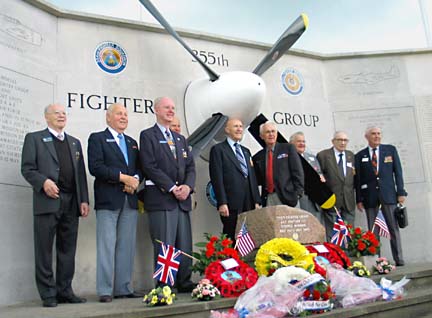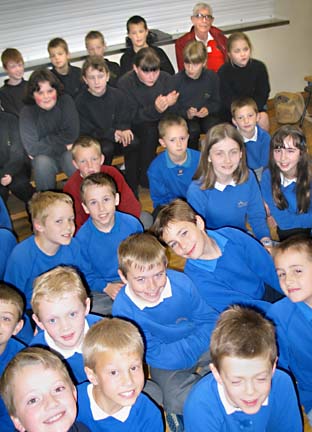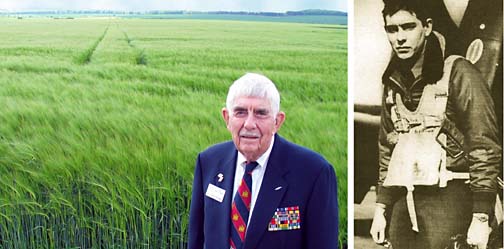

|
My Turn Burl Burlingame |
DISCOVERING DAD / FATHER'S DAY
BURL BURLINGAME / BBURLINGAME@STARBULLETIN.COM
Surviving members of the 355th Fighter Group rededicated their memorial recently in the English countryside.
To England and
back with DadDad doesn't talk much about the war unless he's had a couple of drinks, and even then you have to keep him from drifting into the realm of airplanes, which is related but has little to do with real life and family history. There is a period of his life -- and my mother's -- that seems boundless and malleable, a mysterious dark forest with little light to illuminate the way, the few years between school days in rural Ohio and a rootless existence as the head of a career Air Force family, a wandering life that eventually settled in Hawaii 38 years ago.
The war came along and swept Dad up, rattled the childhood right out of him, stamped and marked the man who raised me. Like most veterans of his age, the war is likely the most vivid period of his life, and one that is quietly put away in a rarely opened compartment.
In college on a swimming scholarship, Dad joined the Army Air Forces and became a fighter pilot. By the time he was 20, he was flying Mustangs for the 8th Air Force, part of the desperate crusade throwing itself against Hitler's Europe.
Once, as a adolescent, I was watching an aviation show on television and I asked Dad if he remembered what life was like on an English airfield during the war. Sure, he said, watching smoke curl upward from his cigarette. He described seeing a bomber full of teenage Americans smack into the ground and cartwheel, flinging debris and flames across the green grass. He spotted what appeared to be a parachute pack hanging on a wire fence and, trying to be useful, he trotted over to retrieve it -- only to discover that it was actually a young man's torso, tangled in the wires. I think it was the first time he'd seen a dead body.
BURL BURLINGAME / BBURLINGAME@STARBULLETIN.COM
World War II fighter pilot William Burlingame sits with English schoolchildren, who think of him as a hero.
I shut up and he continued to watch cigarette smoke curl away into nothing.
We shared a love of aviation and Dad introduced me to the exacting craft of building model airplanes. The first model I built on my own was a clunky Aurora P-51 Mustang, the same kind of airplane he flew during the war, and I painted it with a can of lime-green zinc chromate he liberated from the base motor pool. It was hideous; I'm still building models of Mustangs, still trying to get it right.
Dad retired from the Air Force after a long career and went back to school. For a while, we were in college at the same time and, since our names are the same, our transcripts would get mixed up. He got better grades than I did. Eventually he earned a doctorate and taught university classes. The Air Force receded into the past and the war acquired a faint burnish, the rough memory worn down to gleaming daydream.
Like others of Dad's generation -- the generation Tom Brokaw is so impressed by -- the 1980s and '90s were a period in which veterans looked back on the war with perspective and an ability to come to terms with it. My father began attending reunions of the 355th Fighter Group, got involved in creating a memorial commemorating the group's brief, dangerous liaison with the tiny towns of Steeple Morden and Litlington in faraway Cambridgeshire, north of London. Dad spoke of Steeple Morden with a fondness he doesn't have for his own hometown.
BURL BURLINGAME / BBURLINGAME@STARBULLETIN.COM
Sixty years apart: Air Force veteran William Burlingame at the site of his former base in Steeple Morden, Cambridgeshire, then and now.
This spring, it looked like the group association would have its last reunion. All of the members are in their 80s. A last hurrah was planned, a farewell tour, a final addition to the Steeple Morden airfield marker, a closing of the door, a turning off of the lights. Although Dad bought tickets, my mother decided she wasn't up to the trip. Dad has a pacemaker, and a daily cocktail of heart drugs that makes him unsteady at times. Without backup, he wasn't sure he was up to the grind of traveling. Would I be interested in filling in for Mom?
Absolutely. It's impossible to do enough for your parents, and besides, I had not been back to Europe in 20 years. This time, however, I'd be experiencing it through my father's eyes, seeing the places and people that became touchstones in his life and, by extension, my own. A journey into our shared past.
The traveling turned out to be the easy part, even though I haven't traveled with a parent in more than two decades. Dad and I preferred the same hard mattresses, the same amount of ventilation in the rooms, falling asleep and waking up at about the same time, a glass of beer before dinner and something harder afterwards, an amused wariness of artery-hardening English breakfasts. On the other hand, I still hold out hope that Europeans will discover the magic of ice cubes in drinks; after 60 years, Dad has given up on them.
In the rolling green farmlands of Cambridgeshire, I discovered that the war was neither far away nor a fading memory.
The tour was organized by retired tractor salesman and aviation enthusiast David Crow, an apple-cheeked bundle of energy and the 355th's English point of contact. During the war, he was one of the scrawny Brit kids hanging around the airfield, asking, "Got any gum, chum?" In school, when asked what he wanted to be when he grew up, Crow wrote, "A Yank!"
Instead of simply being lonely teenagers thrown into the maw of combat -- the 8th Air Force had the highest casualty rate of any American military organization during the war -- the Americans were heartily appreciated, perhaps more so in retrospect. They had a profound effect on the British simply by their presence. These "fields of Little America" that dotted the English countryside created lasting bonds between America and England, and help explain why the English stick up for us when other countries don't.
Retired sales manager Albert Moore, whom I met in the spectacular 8th Air Force Memorial Library in Norwich, studies the deeds of the 8th Air Force every weekend while his wife goes shopping. Why? His eyes softened. "All those lovely boys sacrificed," he said. "Mr. Hitler would have taken us, no error, if it had not been for the Americans. It was the Yanks saved our bacon, even though we had no bacon left."
Another one of the veteran pilots, Bill "Tiger" Lyons, speaking at the rededication of the 355th Memorial at Steeple Morden, pointed out what a near thing it had been. "Imagine what the world would be like now if the Nazis had won," he said. "Just imagine. Well, I can't. It took desperate teamwork from the diverse peoples of the world to stop fascism, the political movement that wanted to destroy diversity. Well, it was diversity that made us strong, holding hands across an ocean."
It was a mighty near thing, the war. Americans sacrificed lives for it, but we never came close to sacrificing our entire culture and history.
The reunion ceremony caused a bit of a news stir in England, as a panel had been added to the memorial commemorating the Royal Air Force -- the first time an American military organization had so honored the British -- and also because the Duke of Gloucester had asked to be part of the ceremony, reading a religious passage -- the first time a royal had participated directly in such a ceremony. It took place beneath a lowering English sky, in an emerald stand of spring wheat, the long-ago vestiges of the Steeple Morden airfield barely visible in the contours of the land.
At the nearby Steeple Morden schoolhouse, which dates back several centuries, the hallways are illustrated with heroic images of flying Mustangs. The English children greeted the shuffling old American aviators as if they were pop stars. They sang hymns like angels; they performed an American cheerleading routine; a little girl sang "America the Beautiful" solo, in a haunting voice that hung in the air. I saw my Dad and others wipe their eyes.
In nearby Litlington, half the village turned out to feed the Americans in the town center. Relationships were renewed that had begun more than half a century before. The Crown, a Litlington pub that stood during the war, still has 8th Air Force pictures on the walls. Americans lifted pints of dark, bitter beer as they did in the days of 1944, and remarked how it still tasted the same.
Inevitably, a group photo was called for. The American veterans, some with walkers and canes, slowly assembled on Litlington's small public stage. The English folks took snapshots of their heroes and friends. It was likely the last time they'd visit, at least as a group. Even this will pass.
Suddenly the American pilots began to sing:
Off we go into the wild blue yonder
Climbing high into the sun
Here they come, zooming to meet our thunder
At 'em boys, give 'er the gun!
Even Dad, who never sings in church, was bellowing along, smiling and content. The citizens of Litlington clapped delightedly.
I began to understand how this relationship with the British has helped clear away the darkness of war. It is a flame that continues to burn; it is the light that preserves the world. I am immensely proud of my father, not just for surviving the horrors of the war with honor, but for coming to terms with it over the years.
Burl Burlingame is a Star-Bulletin writer and editor.
My Turn is a periodic column written by
Star-Bulletin staff members expressing
their personal views.


